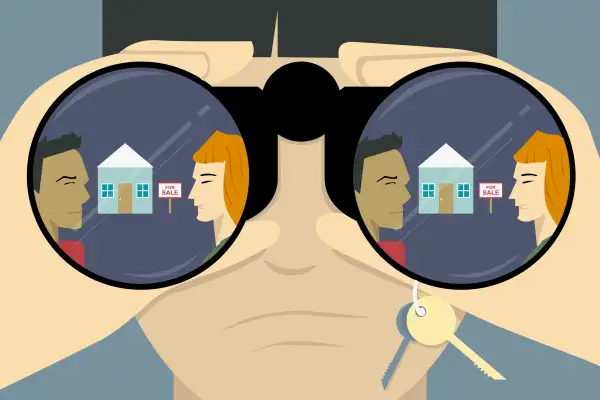More Home Sellers Are Using Security Cameras to Spy on Buyers During Showings

Homebuyers have more to worry about than just skyrocketing home prices and rising interest rates. Apparently, big brother’s a problem too.
In a recent poll, 30% of sellers admitted to using a hidden camera to drop in on buyers when their home was on the market. That’s double the share just three years ago.
“It’s becoming increasingly more common,” says Haley Jones, a real estate agent with eXp Realty in Knoxville, Tennessee.
With the wide adoption of home video and audio technology, the jump’s hardly a surprise.
About 9.4 million homes nationwide now have some sort of Wi-Fi-enabled camera on-site. In 2020 alone, Americans bought a whopping 8 million video doorbells. Another 53% of households have a smart speaker, allowing them to easily listen in on conversations throughout the house — often using just their smartphone.
To be clear, most sellers are not installing cameras or listening devices just to keep tabs on buyers. In most cases, they already have them — often for added convenience or security around the house, but agents say they present a legal and ethical minefield once the property is on the market.
“It isn’t really ethical for sellers to be listening in, and in some states, I’m sure not legal either,” says Brian Chinn, an agent with Newberry Real Estate in Tyler, Texas. “I tell my clients they are not allowed to be listening in on those conversations. They are private, and imagine if we were looking at a house: Would you want that?”
Mining for information
Most sellers who dropped in on showings said they did it to find out what buyers did or didn’t like about the house. Another third said they wanted information to use in negotiations.
“How could you not?” asks Bianca D’Alessio, director of new development for real estate firm Nest Seekers International in New York. D’Alessio has had many clients listen in on showings and says they use their findings to negotiate “all the time.” They also use any negative remarks to drive repairs or better stage their property for the next buyer.
"If buyers keep saying a space feels cluttered or too small, it’s far more impactful hearing it directly from the buyer’s mouth and can help me make the argument for why we need staging,” she says.
Other sellers simply use cameras to ensure their home is safe during showings or to monitor when buyers have left so they can return home. In some cases, agents say, sellers might just be very attached to the home.
“Some sellers like to be really involved — especially if the property has a lot of sentimental meaning,” says Phillip Salem, a real estate agent with Compass in New York.
Maggie Sutherland, a family and newborn photographer with Sutherland Photography in St. Louis, is one of the many recent sellers who’s listened in on buyers. When her Knoxville, Tennessee home was on the market last fall, she used her Ring doorbell and additional Ring camera to monitor four showings and the final home inspection. For her, it was more out of curiosity.
“I just wanted to hear what people thought,” says Sutherland, who notes that both cameras were clearly visible and that a Ring sticker on her front window disclosed the devices' presence. “If we didn't get an offer right away, I think the feedback would have been helpful.”
Is it legal?
No matter what the seller’s reasoning is, there are often legal concerns when it comes to listening in or watching a buyer’s showing.
The exact laws vary by state, but in most places, video surveillance is allowed — without audio — as long as it’s in an area where the person wouldn’t typically expect privacy.
As Peter Zinkovetsky, managing partner at Avenue Law Firm in New York, explains, “The state considers surveillance illegal when installed in an area like a bedroom, dressing room, changing room, bathroom or shower — places where someone would expect privacy and not give consent or know that recording was taking place.”
Audio recording, however, is a different story. The legalities here depend on whether your state is a one-party or two-party consent state. In a two-party consent state, all parties involved in the interaction must consent to being recorded. In a one-party consent state, just one of the parties does.
There’s a catch, though. To be considered a “party,” the seller would have to be present and participating in the conversation that’s being recorded.
“As long as the person recording is part of the conversation, they may record without the other party's consent. Otherwise, they will need consent,” Zinkovetsky says. “Listening to the conversation without being part of it or getting consent is considered eavesdropping.”
Sellers who fail to adhere to these laws could see a civil suit from buyers or even face criminal charges, Zinkovetsky says. In New York, eavesdropping is a class E felony with a penalty of up to four years in prison. (Even sellers whose devices accidentally record buyers could be liable too — that is, if they listen to the recordings.)
Skipping the spying
Agents tend to discourage sellers from listening in or taping buyers — and not just due to legal concerns.
In some cases, recording might even turn off a buyer completely. According to LendingTree’s poll on hidden cameras, 44% of buyers said they’d skip out on their dream home if they knew the seller had recorded their tour. Another 56% said the practice is unfair and an invasion of privacy.
“Something else to consider is that when sellers are in-person for a showing, buyers do not feel free to fully look through and check out the property,” Jones says. “The same applies here. Knowing that sellers are listening in is uncomfortable, to say the least. When a buyer doesn’t feel comfortable during a showing, they are likely not to buy the house.”
Still, with the prevalence of smart speakers, doorbells and cameras — not to mention the baby monitors and other potential listening devices out there, the temptation to spy remains. For sellers who do listen in, the key to legal protection is disclosure.
“If the seller is going to listen in, they need to obtain consent from all the parties involved,” Zinkovetsky says. This could simply mean notifying buyers they’ll be recorded upon entering the property or, like Sutherland, posting a clearly visible sign stating that a video or audio surveillance system is in use.
In some cases, multiple listing services — the local databases used by agents to list homes — require disclosing on-site security and recording devices. For those that don’t, agents can include notes about these devices in the “agent remarks” field, so a buyer’s agent can alert them before scheduling a tour.
Are you being watched?
If you’re on the buying side of the transaction, ask your agent about potential cameras or listening devices before entering a home, and be on the lookout for any as you enter and tour the property. Though some devices are obvious (Ring doorbells are often the easiest to spot), others may be hidden or concealed completely.
“The only ones that are obvious have been the ones at the front door,” Jones says. “Everything else has mostly been hidden. One time I was touring a house with buyer clients, and we opened a closet only to find that the entire closet was full of video monitors from surveillance cameras in and around the house. I never saw a single camera.”
Even if you don’t spot a device, though, agents say you should assume you’re being watched or listened to at all times — and act and speak accordingly.
“The best practice with technology now is to treat the home as if someone is listening,” says Brian Chinn, an agent with Newberry Real Estate in Tyler, Texas. “As cost continues to go down, utilization will only go up.”
More from Money:
Leaving Dogs and Taking Toilet Seats: Inside the Weirdest Home Seller Demands of 2021
Is the Housing Market Finally Cooling? A Guide to Home Buying This Winter
Oregon Is About to Ban a Popular Homebuyer Bidding War Tactic

